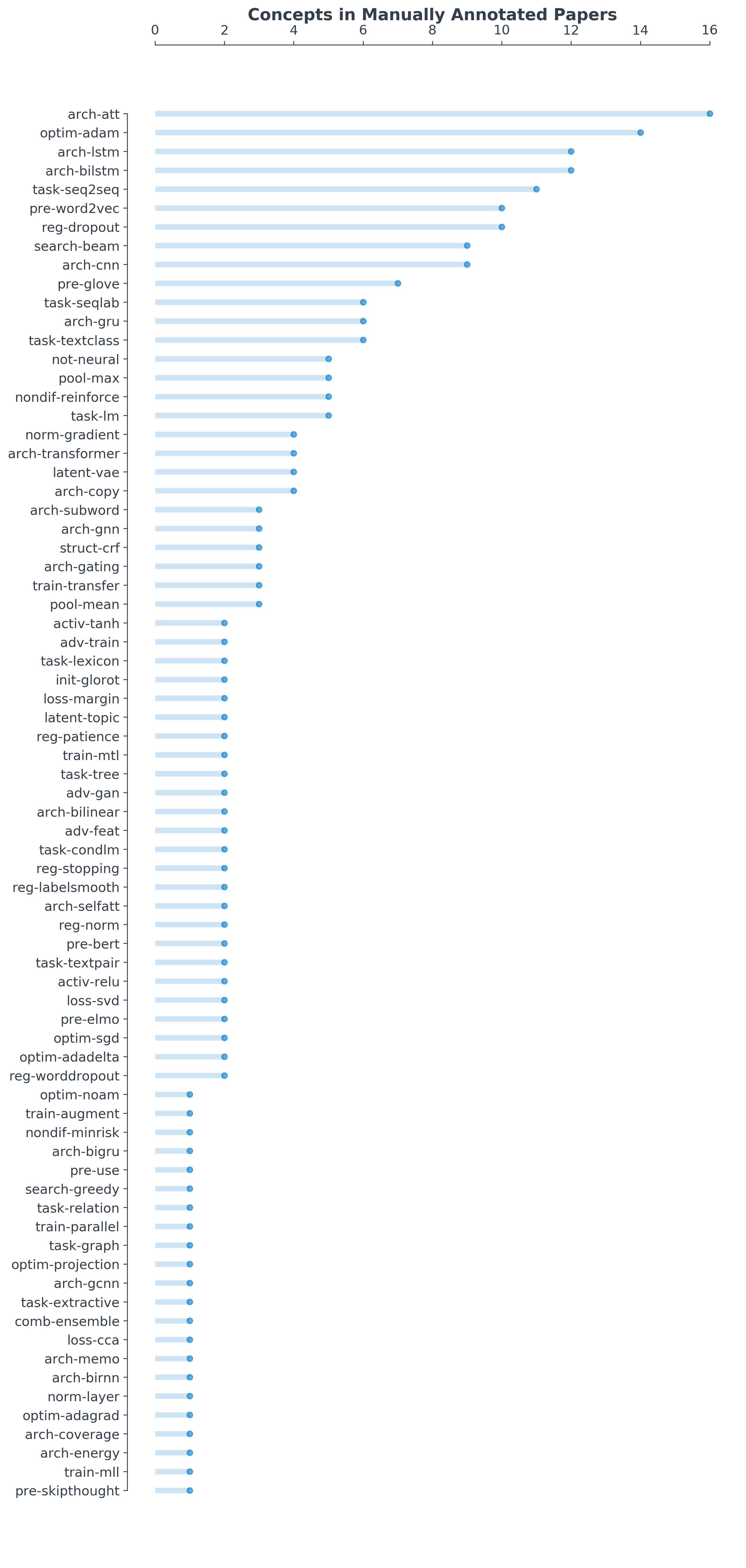by Graham Neubig, Pengfei Liu, and other contributors
This is a repository that makes an attempt to empirically take stock of the most important concepts necessary to understand cutting-edge research in neural network models for NLP. You can look at two figures below, generated automatically and through manual annotation, to see which of these topics are most common in current NLP research in NLP (in recent papers in the ACL anthology). See the list of concepts to see a more complete description of what each of the tags below means, and also see the directions below the figures if you want to contribute to the project, or want to figure out how to generate the graphs yourself.
There are several ways to contribute:
- Perform annotation: We could use more manual annotations of the concepts covered by papers, so please take a look below if you're interested in helping out in this regard.
- Improve the code: Check the "issues" section of the github repo, there are still several things that could be done to improve the functionality of the code.
If you want to run the code here, first get the requirements:
pip install -r requirements.txt
Also, install poppler through your favorite version control software.
Then download the ACL Anthology github repository:
git clone https://github.com/acl-org/acl-anthology.git
- Read
concepts.mdto learn more about the concepts that are annotated here. - Run
get_paper.py(directions below) to get a paper to annotate with the concepts contained therein. - When the paper is downloaded, a text file corresponding to the paper ID will be written out to
auto/ID.txt. This will include some comments with the paper name, title, PDF location, etc. In addition, it will have some automatically provided concept tags that were estimated based on the article text. - Manually confirm that the automatically annotated concepts are correct. If so, then delete the comment saying "# CHECK: ". If the concepts are not included in the paper, then delete them.
- Add any concepts that were not caught by the automatic process.
- Once you are done annotating concepts, move
auto/ID.txttoannotations/ID.txt. You can then send a pull request to the repository to contribute back.
Examples Running get_paper.py
Get random papers to annotate:
- 1:
python get_paper.py --years 18-19 --confs "P,N,D" --n_sample 2 --template template.cpt --feature fulltext
Get a specific paper to annotate:
- 2:
python get_paper.py --paper_id P19-1032 --template template.cpt --feature fulltext
where:
paper_id: it usually takes the form: P|N|D-1234. Moreover, once thepaper_idhas been specified,years,confs, andn_sampleare not required.confs: a comma-separted list of conference abbreviations from which papers can be selected (P,N,D)n_sample: the number of sampled papers if paper_id is not specifiedtemplate: the file of concept template (e.g. template.cpt)feature: which part of paper is used to classify (e.g. fulltext or title)
To generate bar charts like the ones above, you use aggregate_tags.py to calculate aggregate statistics, then
draw_bar.py to generate the bar chart.
If you want to do this for the hand-annotated concepts included in this library, you can run the following commands.
python aggregate_tags.py annotations --concepts concepts.md > annotations.tsv
python draw_bar.py --tsv annotations.tsv --fig annotations.png
If you want to do this for automatically-generated tags from some portion of the ACL anthology, you can run the following command, which will download the papers from all the specified conferences (e.g. ACL, NAACL, and EMNLP from 2018 and 2019).
python get_paper.py --years 18-19 --confs "P,N,D" --n_sample all --template template.cpt --feature fulltext
python aggregate_tags.py auto --concepts concepts.md > auto.tsv
python draw_bar.py --tsv auto.tsv --fig auto.png
Thanks to Yoav Goldberg and the TAS for CS11-747 who gave feedback on the categorization of concepts. Also, thanks, of course, to everyone who has contributed or will contribute.

